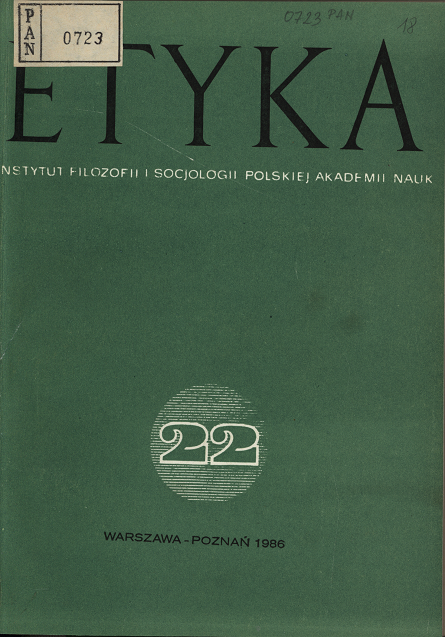Porównanie zasad sprawiedliwości dystrybutywnej
Abstract
The purpose of the article is to draw comparisons between the major normative rules of distributive justice. This comparison is based on a kind of distribution of goods which is sometimes called the problem of pure distribution, i.e. the distribution of a homogeneous, infinitely distributable good in a situation when claims of different persons on the distributed good were in no way differentiated. This problem is defined against the background of typology of problems of goods distribution. Normative rules of distributive Justice are defined formally as social welfare functionals. Eight rules of justice are distinguished: the rule of the utilitarian, Rawls’s maximin rule, Rawls’s lexicographical maximin rule, the maximax rule of the conservatives, the rule of lexicographical maximax of the conservatives, Nash’s rule, and two rules advanced by egalitarianists which differ by the meaning attributed to equality of distribution (equal utility or equal size of the good, accorded to individual persons in result of the distribution). Premises underlying the construction of these rules of justice and which indicate the measurement of preferences and possibilities of interpersonal comparisons are discussed. The same justice rules are also presented graphically. The method of the comparison amounts to examining if a certain set of ethical postulates is fulfilled by the rules under consideration. Several ethical postulates concerning the distribution of goods are formulated. Some of them define conditions any method of evaluating inequality of distribution of goods should fulfil. The remaining postulates involve more general requirements put to methods of making social decisions. Theorems about the fulfilment or nonfulfilment by individual rules of distributive justice of the considered ethical postulates are presented in a recapitulating table. The author demonstrates that almost a1l justice rules fulfil general postulates put to methods of social decision making. Nash’s rule and the two rules of the egalitarians are the exceptions, as they do not fulfil the postulate of separability with respect to unconcerned individuals. Besides, the two rules of the egalitarians do not fulfil the Pareto optimality principle. Significant differences between rules of distributive justice become manifest only when you compare way they fulfil ethical postulates concerning the manner of evaluating the inequality of the distribution. With regard to this set of postulates, they can be arranged along a definite continuum, with Rawls’s lexicographical maximin — the radical egalitarian rule, and the lexicographical maximax of the conservatives – the radical conservative rule as the extreme points of this continuum.Downloads
Published
Issue
Section
License
Works published in ETYKA are available under the Creative Commons Attribution No Derivatives 4.0 International Licence (CC BY-ND), which entails acknowledgement of authorship without derivative works. Under this licence, Authors keep their copyrights and agree that their works can be used again legally for any purpose, including commercial ones, except for the creation of derivative works, without the need to obtain previous consent of the Author or publisher. The articles can be downloaded, printed, copied and disseminated; under the condition that the authorship is indicated accordingly, together with the place of original publication. The Authors preserve their copyrights to the above-mentioned works without any limitation whatsoever.



